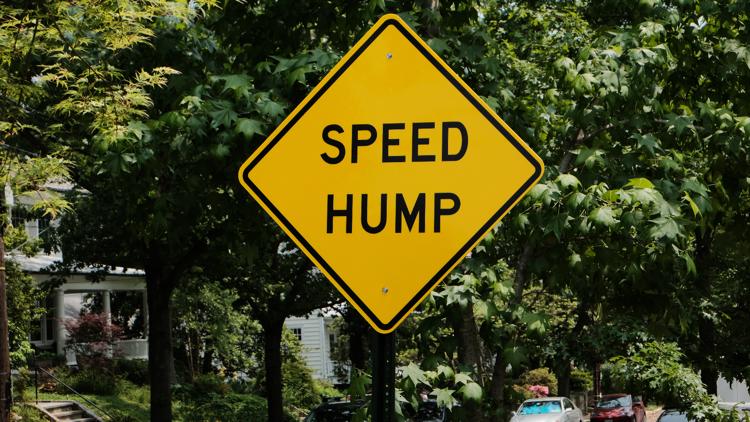MEMPHIS, Tenn. — Memphis is the 25th worst city to drive in across the United States, according to an April ranking by Forbes Advisor.
Although Tennessee Highway Patrol officials have sent ten additional troopers to the Memphis District to prevent interstate speeding, according to THP Lt. Bill Miller, Memphians have also expressed concerns about cars speeding through residential areas.
One step Memphians can take to combat speeding and reckless driving in their neighborhood is submitting a request to the city to install speed humps.
Unlike speed bumps, which are usually found in parking lots, speed humps are used to reduce speeding in residential areas, according to the U.S. Department of Transportation.
Studies show that speed humps can reduce speed by nearly 10 miles an hour, according to the U.S. Department of Transportation.
But the installation of speed humps comes with downsides.
According to the BBC, speed humps can increase CO2 emissions due to cars braking and accelerating repeatedly.
Additionally, a 2018 study by Ed Graham and Adam Jones in North Carolina concluded that speed humps around residential neighborhoods are associated with lower home prices.
“If you think about the effect in a market context, speed bumps may make a home ‘slightly’ more attractive to elderly buyers and those with children, but to other potential buyers, they make the home ‘much less’ attractive,” said Jones.
Graham said they do slow cars down, but it is “at a cost.”
Graham and Jones’ research found that while speed humps may provide a perception of public safety, people may not want to pass over a speed hump every time they leave their house.
Additionally, Graham and Jones say residents may consider the degradation of gas, potential damage to their cars and slower response time of emergency vehicles.
However, Memphis City Councilman Jeff Warren said arguments such as these are not authentic and emphasized the effectiveness of speed humps.
“I’ve seen them work… No one likes to bottom out their car,” Councilman Warren said. “Unless someone is really intent on speeding, then in that case, they hurt their car, or they hurt themselves. I think that you can't stop that person, but you can make it to where at some point, they go, 'I don't really need to do this. It's not good for me or my car.'”
He also offered his opinion on an alternative method that could slow down cars in residential areas.
“One thing we can do is think about lowering the entire city speed limit everywhere just to get people to think about driving more slowly," Councilman Warren said. "That's not going to be a very popular idea, but it will save gas, and maybe we'll have people just be kinder to each other because we know we're not going to be speeding everywhere."
Speed hump request procedures can be found here. Two conditions will be considered in requests: speed, which will be measured by comparing the posted speed limit to the speed of vehicles over a 24-hour period, and volume, which is measured by whether over 300 (but less than 7000) vehicles use the street within 24 hours. Exceptions may be made if there is excessive speeding.
If your street meets the criteria, at least 75 percent of residents nearby must approve the speed humps. Rejected street segments are not eligible for reapplication for a period of two years from the rejection date, according to the city’s website.
City of Memphis officials said it can take up to two years for the five-step process - request, study, design, petition and construction - to be completed. Priority is given to requests near a school, and the process could be much shorter in this case. Exceptions can also be made if there have been three or more crashes per year over the past three years that could have been prevented with speed humps.
Beyond speed humps, requests for any traffic calming measures in your neighborhood, such as curb extensions, should go through 311, according to City of Memphis officials.
Are you seeking solutions to a problem facing you and your community? We want to hear from you. Text “SOLUTIONS” and include your concern to (901) 321-7520. You can also fill out this contact form.



